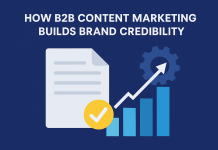In the ever-evolving landscape of B2B marketing, staying ahead of the curve is crucial for maintaining a competitive edge. As we look toward the future, several trends are set to shape the industry, offering new opportunities for growth and innovation.
This blog explores five B2B marketing trends expected to dominate the industry, providing insights into how businesses can leverage these developments to drive success.
1# Artificial Intelligence (AI)
AI’s Role in Transforming B2B Marketing
Artificial Intelligence (AI) is no longer a futuristic concept but a powerful tool reshaping B2B marketing strategies. From chatbots and personalized content recommendations to predictive analytics and customer behavior insights, AI enables businesses to create more targeted and effective marketing campaigns.
Key Benefits of AI in B2B Marketing:
- Personalization at Scale: AI allows for hyper-personalized marketing by analyzing vast amounts of data to understand customer preferences and behaviors.
- Enhanced Decision-Making: Predictive analytics powered by AI can forecast trends and customer needs, enabling businesses to make informed decisions.
- Improved Customer Experience: AI-driven chatbots and virtual assistants provide real-time support, enhancing customer engagement and satisfaction.
As AI continues to advance, its integration into B2B marketing will only deepen, making it a trend that businesses cannot afford to ignore.
2# Data Privacy and First-Party Data
The Shift Towards Data Privacy and First-Party Data
With increasing concerns over data privacy and the phasing out of third-party cookies, businesses are turning to first-party data to drive their marketing efforts. First-party data—information collected directly from customers—offers more reliable insights and ensures compliance with data privacy regulations.
Key Strategies for Leveraging First-Party Data:
- Building Trust with Transparency: Communicating how customer data will be used builds trust and encourages data sharing.
- Enhanced Targeting: First-party data enables more accurate targeting, leading to higher conversion rates and improved ROI.
- Data-Driven Personalization: Leveraging first-party data allows for the creation of personalized content and offers tailored to individual customer needs.
As data privacy becomes increasingly critical, the focus on first-party data will become a dominant trend in B2B marketing.
3# Podcasts
The Rise of Podcasts in B2B Marketing
Podcasts have seen a significant surge in popularity, emerging as a powerful tool for B2B marketers. With busy professionals seeking content that they can consume on the go, podcasts offer an engaging way to reach and educate target audiences.
Why Podcasts are Effective in B2B Marketing:
- Convenience and Accessibility: Podcasts can be consumed anytime, anywhere, making them a convenient option for busy professionals.
- Building Authority: Hosting or guesting on industry-specific podcasts helps businesses establish thought leadership and credibility.
- Engaging Storytelling: Podcasts allow for in-depth discussions and storytelling, making complex topics more accessible and engaging.
As more B2B companies recognize the value of podcasts, this medium is set to become a staple in the marketing mix.
4# Video Content
The Dominance of Video Content in B2B Marketing
Video content continues to dominate as a preferred medium for B2B marketing. Whether it’s product demonstrations, customer testimonials, or educational webinars, video content offers a dynamic and engaging way to communicate with potential clients.
Key Advantages of Video Content:
- Increased Engagement: Videos are more likely to capture attention and engage viewers compared to text-based content.
- Enhanced Communication: Complex ideas and products can be more effectively communicated through video, making it easier for prospects to understand value propositions.
- Improved SEO: Video content is highly shareable and can significantly boost SEO efforts, leading to higher search rankings and increased visibility.
With the growing demand for visual content, businesses that invest in video marketing will likely see substantial returns.
5# Automation of B2B Processes
The Impact of Automation on B2B Marketing
Automation is revolutionizing B2B marketing by streamlining processes and enabling more efficient campaign management. From email marketing and lead nurturing to customer relationship management (CRM), automation tools are helping businesses save time and resources while driving better results.
Benefits of Marketing Automation:
- Increased Efficiency: Automation reduces manual tasks, allowing marketing teams to focus on strategy and creativity.
- Consistent Customer Engagement: Automated workflows ensure that leads are consistently nurtured, improving conversion rates.
- Data-Driven Insights: Automation platforms provide valuable insights into campaign performance, enabling continuous optimization.
As technology advances, the automation of B2B processes will continue to be a game-changer, making it a trend that will shape the future of the industry.
Conclusion
The B2B marketing landscape is rapidly evolving, with new trends emerging that offer exciting opportunities for growth and innovation.
By embracing Artificial Intelligence, prioritizing data privacy, leveraging first-party data, exploring podcasts, investing in video content, and adopting automation, businesses can stay ahead of the competition and achieve long-term success.
As these trends continue to dominate the industry, staying informed and agile will be key to thriving in the dynamic world of B2B marketing.
I hope you find the above content helpful. For more such informative content please visit B2B-Reports.












